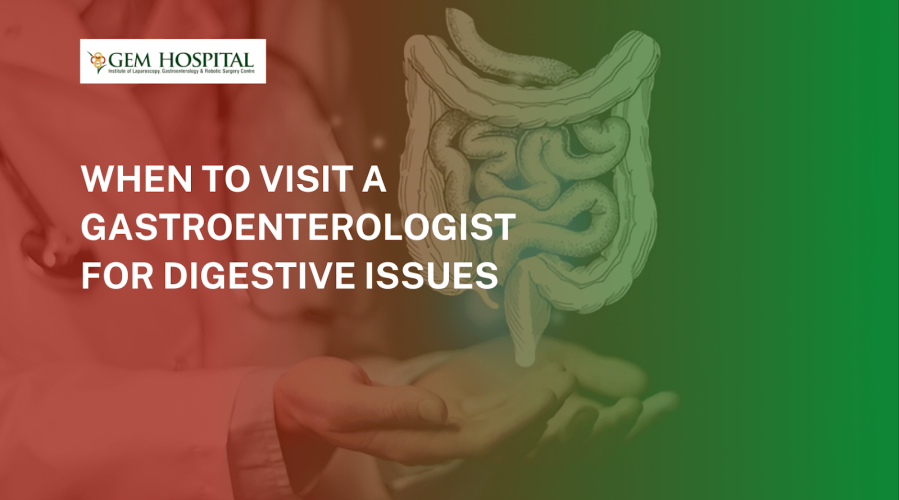Consult experienced hernia doctors in Chennai for expert surgical care. Advanced diagnosis, safe hernia surgery, and faster recovery with specialized treatment.
When to Visit a Gastroenterologist for Digestive Issues

Digestive discomfort is something that is experienced by everybody at some point. A large meal, stress or even a short infection can leave you feeling bloated, acidic or have irregular bowel patterns. But how do you know when the symptoms you are experiencing are more important than discomfort?
That’s why the need for a Gastroenterologist for Digestive Issues is valuable. A gastroenterologist is a medical specialist that is trained to diagnose and treat medical disorders of the gastrointestinal (GI) tract from chronic constipation to complicated liver disease.
Common Digestive Symptoms You Shouldn’t Ignore
While everyone can experience occasional stomach upset, most persistent and/or reoccurring issues are best managed in the hands of a medical professional. Consider seeing a gastroenterologist for any of these symptoms:
1. Frequent Heartburn or Acid Reflux
If you have habits of reaching for the antacids more than twice a week, you may have Gastroesophageal Reflux Disease (GERD) if left untreated GERD may result in inflammation of the esophagus, ulcers or even precancerous changes.
2. Persistent Bloating and Gas
Bloating after eating a large meal is common and happens occasionally with everyone, but if it happens frequently with or without pain you may have irritable bowel syndrome (IBS), lactose intolerance and possibly celiac disease.
3. Unexplained Weight Loss
Although losing weight without trying may seem like a perk, it may be a sign of something serious going on behind the scenes-such as Crohn's disease, ulcers, malabsorption issues, or even gastrointestinal cancers.
4. Blood in Stool
If you believe you have bright red blood and dark, tarry stools (or both), and also potentially having mucus as well, you will want to see a gastroenterologist as soon as possible. Blood in the stool can be a sign of hemorrhoids, anal fissures, inflammatory bowel disease (IBD), and colon cancer as well.
5. Chronic Constipation or Diarrhea
If you are having new altered bowel habits in the last weeks or months, you could be having IBS, thyroid problems, intestinal obstruction, or any other functional disorder. A gastroenterologist can assess your symptoms and determine if treatment or further testing is necessary.
Conditions Managed by a Gastroenterologist
A Gastroenterologist for Digestive Issues is equipped to handle:
- Gastroesophageal reflux disease (GERD)
- Ulcers and Gastritis
- Irritable Bowel Syndrome (IBS)
- Inflammatory Bowel Disease (IBD)
- Gallstones and Gallbladder Diseases
- Liver diseases (Hepatitis, Fatty Liver, Cirrhosis)
- Pancreatitis
- Celiac Disease
- Colon polyps and Colorectal Cancer
- Swallowing disorders
- Constipation or Diarrhea
- Hemorrhoids and Anal Fissures
They also perform specialized diagnostic procedures such as endoscopy, colonoscopy, ERCP, liver biopsy, and capsule endoscopy.
When Should You Not Delay a Visit?
Some symptoms require immediate consultation:
- Vomiting blood or passing black, tarry stools
- Severe abdominal pain that worsens over time
- Difficulty swallowing (dysphagia)
- Jaundice (yellowing of skin and eyes)
- A family history of GI cancers or chronic GI disorders
In such cases, early detection can significantly improve treatment outcomes.
Importance of Early Diagnosis
Digestive diseases often progress silently. What begins as mild discomfort might worsen over time if left untreated. For example:
- Long-term acid reflux can damage the esophagus and cause Barrett’s Esophagus, a precancerous condition.
- Ignored symptoms of IBD can result in intestinal damage and complications requiring surgery.
- Fatty liver disease, if undiagnosed, can lead to cirrhosis or liver failure.
That’s why consulting a Gastroenterologist for Digestive Issues at the right time is crucial for your long-term health.
Lifestyle Factors That Worsen Digestive Health
Poor lifestyle choices often aggravate digestive issues:
- Excessive intake of spicy, oily, or processed foods
- Lack of fiber and hydration
- Sedentary lifestyle
- High alcohol consumption
- Overuse of painkillers or NSAIDs
- Unmanaged stress and anxiety
While diet and lifestyle play a role, chronic symptoms should not be dismissed as just “gas” or “indigestion.” A specialist's evaluation is the key to proper care.
What to Expect During Your Consultation
Your gastroenterologist will:
- Take a detailed medical history
- Ask about your symptoms, diet, lifestyle, and medications
- Conduct a physical examination
Recommend diagnostic tests such as:
- Blood tests
- Ultrasound
- Endoscopy or colonoscopy
- CT/MRI if needed
Based on findings, a personalized treatment plan will be created which may include medications, dietary modifications, or further investigations.
Take the Right Step Towards Digestive Wellness
If you've been keeping your ongoing stomach issues or ambiguous GI symptoms to yourself, it's time to get clarity. Waiting on medical advice could lead to further complications.
At GEM Hospital, our gastroenterologists combine top of the line diagnostics and advanced treatments with patient care that understands the importance of your digestive health. Our goal is to obtain results for your acute or chronic GI complaints, using the latest technology and a patient-first perspective.
Don't ignore your gut instinct! Contact GEM Hospital today and take charge of your digestive health by scheduling an appointment with a gastroenterologist.
Blogs & Article
Get advanced liver transplant treatment in Chennai with expert surgeons, modern technology, and comprehensive care for safe and successful outcomes.
Get advanced piles treatment in Erode with expert doctors. Safe procedures, modern technology, and effective care for fast relief and recovery.


